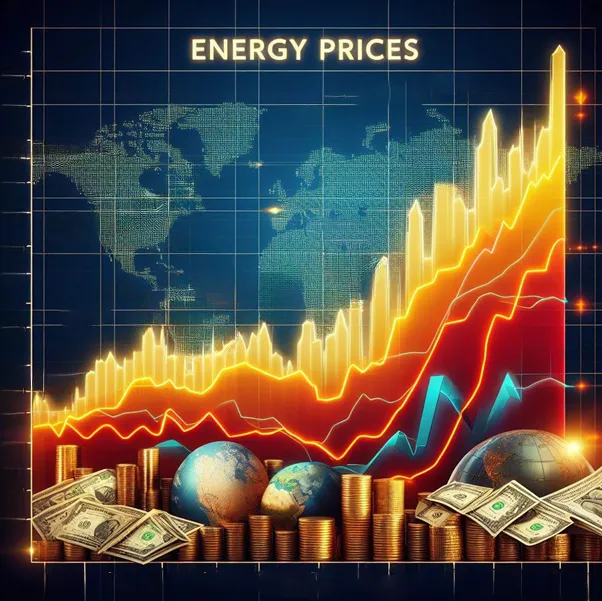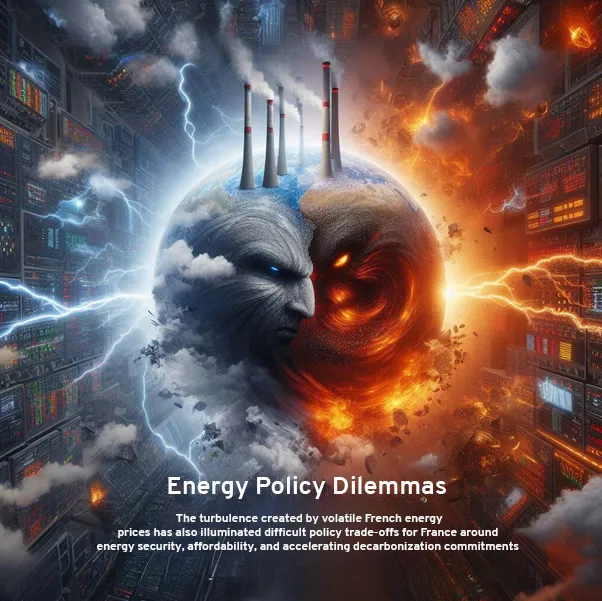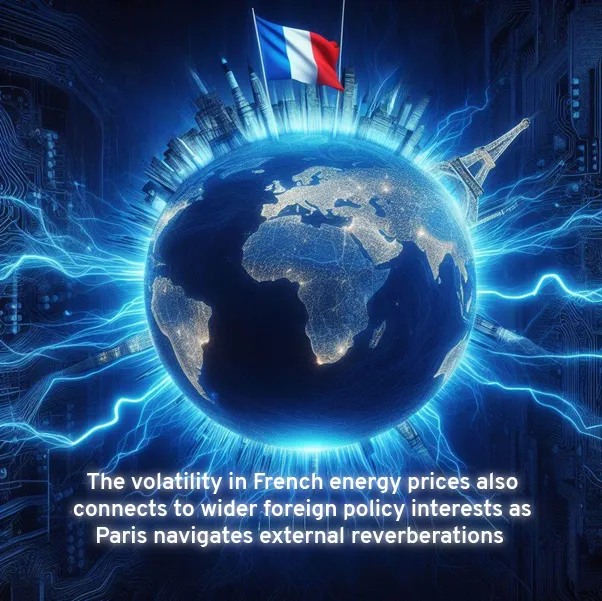introduction
French Energy Prices have recently become a significant economic issue in France. The surge in prices is a result of various factors, such as the post-pandemic recovery and Russia’s invasion of Ukraine. As a consequence, French policymakers are faced with a challenging dilemma. They must balance the need to support economic growth, combat climate change, and shield households from the impacts of rising living costs.
This article delves into the repercussions of the sharp increase in French Energy Prices on the economy and the complex decision-making process that lies ahead.
The Energy Price Challenge Intensifies
French energy prices were already rising during 2021 as oil and gas demand rebounded after COVID-19 lockdowns. However, the full-scale Russian attack on Ukraine exacerbated the energy price spike severely due to import dependence on now uncertain Russian supplies.

By June 2022, French electricity prices had surged to over €800 per megawatt-hour from around €50 in 2019. Natural gas contracts also quadrupled compared to 2020. Energy prices now sit at the core of policy debates in France given the economy’s sensitivity.
These high French energy prices stem from multiple global factors France cannot control alone including supply squeezes, geopolitics, surging post-pandemic energy appetite in Asia, and climate stresses. This makes navigating the turbulence tricky for French policymakers.
Economic Impacts
Rising French energy prices over 2021-2022 are now dampening France’s growth outlook and worsening cost-of-living issues:
Slower Growth Projections
Higher inflation triggered by pricier energy has cut French GDP projections. The IMF downgraded 2022 forecasts from over 4% down to 2.5% by October. Households facing huge power bill rises are cutting other spending dragging on France’s dominant services economy. Energy-intensive industries like steel and chemicals are also slowing output impacting jobs.
Reduced industrial activity and consumer demand risks tipping France towards stagflationary conditions stunting living standards. Business confidence has already dropped given uncertainty over how long elevated French energy prices will last. The drag on growth could worsen if the Ukraine conflict and supply strains persist hampering France’s economic rebound.
Declining Household Purchasing Power
Surging French energy prices have helped drive inflation to over 7% reducing household purchasing power significantly. Poorer French families now allocate over 9% of income just on gas and electricity bills compared to 4-5% historically. This energy cost-of-living crisis has become a major political issue pressed by opposition parties.

Rising petrol costs have also sparked discontent. Critics argue the government’s fuel rebates and electricity bill caps have been insufficient to offset increasing home heating, travel, and food costs faced by lower-income groups. There are growing calls demanding larger subsidies and pay rises.
Unless real wages start rising or social supports increase, the erosion of French household purchasing power due to inflation disproportionately fed by high energy looks likely to depress consumer spending and deepen inequality.
Pressures on Public Finances
The French government has also needed to massively scale up subsidies and tax relief to help cushion households from rising French energy prices expected to cost €45 billion in 2023. AFP estimates lower economic growth and higher energy relief spending will enlarge France’s budget deficit by over €20 billion reversing fiscal consolidation efforts.
This unexpected rise in public expenditure risks long-term debt sustainability. It may force future tax rises or spending cuts to rebalance finances unless strong growth returns quickly. However, slower activity from reduced household spending power poses problems for buoyant recovery.
Trade Balance Impacts
Higher French energy prices have also bloated the import bill for fossil fuels widening France’s sizeable trade deficit since it lacks major domestic oil and gas production beyond some North Sea fields. The cost of raw material and energy imports jumped from €73 billion to €120 billion annually between 2021 and mid-2022.
This rising import dependence costs French jobs and growth. It also transfers more French wealth abroad through pricier imports lowering national income. Boosting France’s exporting competitiveness will be crucial to offsetting the external alternate drag from fossil gas imports weighed down by using multiplied worldwide power expenses. But once more, sluggish home calls for projections undermine export optimism.
Energy Policy Dilemmas
The turbulence created by volatile French energy prices has also illuminated difficult policy trade-offs for France around energy security, affordability, and accelerating decarbonization commitments:
Balancing Energy Security Priorities
The Ukraine crisis confirmed France’s vulnerability to relying on Russian gas, highlighting energy security risks as imports account for almost ninety-nine percent of countrywide fuel consumption. In response, France has reversed planned nuclear strength plant closures and extended renewables growth to decorate self-sufficiency.

But Paris also faces pressure from industry lobbies and political critics to increase home fossil gasoline output for more insulation from global fee spikes at some stage in the energy transition. However, expanding oil and fuel manufacturing would contradict France’s legislated weather neutrality ambitions. This leaves France torn between energy protection arguments and environmental duties over the optimum domestic strength delivery blend considering exogenous global electricity charge volatility.
Managing Household Energy Poverty
Tackling mounting energy poverty also poses problems over subsidy costs. Over 4 million French households now struggle to pay energy bills as prices outstrip income growth. While short-term heating and transport grants offer relief, chronically high French energy prices will further entrench inequality without efficiency measures and restructuring how costs fall on lower-income groups.
Yet increasing bill discounts too heavily risks distorting price signals damping incentives for households to adopt efficiency upgrades ultimately keeping consumption higher than optimal. There are also fiscal limits on the state’s capacity to socialize rising global fossil fuel costs nationwide. Targeting the most vulnerable groups efficiently remains imperative but complex.
Achieving Carbon Emissions Targets
Finally, the spike in French energy prices has made achieving France’s ambitious carbon neutrality, target by 2050 much more challenging. Avoiding a government clampdown on petrol and diesel that sparked previous Yellow Vest movement protests will require gently persuading French consumers and businesses towards greener alternatives.
However the potency of price signals risks being diluted by subsidies while slower economic activity undermines funds for green investment. Businesses may also resist decarbonization spending if it lifts production costs without sufficient compensating government support or regulation. Furthermore, doubts remain whether renewable alternatives can scale fast enough to completely replace hydrocarbons this decade considering infrastructure constraints.
These uncertainties leave French climate policy ambitions precariously dependent on global energy prices staying higher to incentivize reductions. Yet economically damaging sustained high prices that worsen inequality and poverty pose major political and social risks domestically for France.
Regional Dimensions
As a core EU member, France must also navigate the bloc’s collective policy response to volatile energy prices to align interests across national boundaries. Key aspects here include:
EU Emissions Trading Scheme

The EU’s carbon pricing mechanism has seen rates spike in tandem with gas prices given how emissions certificates are benchmarked to fossil fuels under the ETS cap-and-trade scheme. This risks undermining bloc-wide decarbonization by driving heavy industry out of Europe.
France has joined calls for ETS reforms to stabilize investment signals. However, agreement remains elusive given divisions between Western and Eastern EU states over the appropriate pace of green transition considering differing energy mix exposures.
Energy Market Redesign
Surging electricity costs have also fuelled French and European scrutiny of the liberalized EU energy market’s performance. Critics blame speculative trading for amplifying wholesale power price volatility. France wants a “deep reform” to strengthen state influence over cross-border energy flows.
However, other EU members are wary of reforms infringing single market principles. Tensions also persist between France’s preference for objectives like security over pure free market logic in the energy sector relative to more economically liberal North European states. Realigning regulations remains contested.
Global Reverberations
The volatility in French energy prices also connects to wider foreign policy interests as Paris navigates external reverberations:
Russia Response Coordination
As a European leader, France has played an integral role in negotiating the EU’s sanctions regime against Moscow for its invasion of Ukraine. Managing bloc solidarity has required compromises given dependence on now-embargoed Russian oil and gas varies enormously across member states.
Paris also faces complex calculations balancing punitive measures to pressure Russia as Ukrainians suffer heavily against mitigating damage to European economies from severed energy flows and surging supply costs.
Middle East Outreach

Additionally, as France urgently explores alternative fuel and oil delivery sources to replace Russia, strengthening ties with the most critical producers inside the Middle East and North Africa has risen in precedence. However, aligning positions across energy security, exchange, overseas war zones, terrorism, and human rights stay intricate diplomatically.
For instance, at the same time as France criticized Saudi Arabia over the Khashoggi killing, Riyadh remains too vital as an oil swing manufacturer for Paris to chance to rupture members of the family through moral posturing. This pragmatism alerts worldwide energy market volatility that affects foreign guidelines.
The Balancing Act Intensifies
In summary, the surge in French energy prices over 2021-2022 has created a complex economic challenge for French policymakers and wider society around trade-offs. The turbulence has slowed France’s economic rebound from COVID-19, worsened the cost-of-living crisis facing citizens, pressured public finances, strained external accounts, and exposed difficult trade-offs around energy security, affordability, and decarbonization
Conclusion
In conclusion, navigating the monetary impacts of rising power charges while balancing safety, equality, and sustainability issues poses a crucial project defining France’s long-term future. The coverage direction Paris steers between household comfort, business pursuits, weather goals, and social brotherly love will reverberate via living standards, international partnerships, electoral effects, and the viability of inexperienced transition plans. While in part alleviated by way of subsidies, consistently excessive electricity prices hazard lasting harm, curtailing French prosperity.
Careful diplomatic and reform efforts, both domestically and throughout the EU, remain essential to alleviate this intensifying strain on more than one front for French society.



